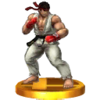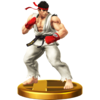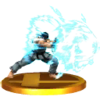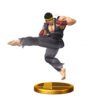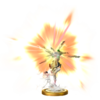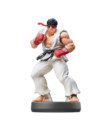Ryu (SSB4)
| Ryu in Super Smash Bros. 4 | |
|---|---|
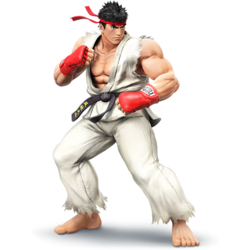 
| |
| Universe | Street Fighter |
| Other playable appearance | in Ultimate |
| Availability | Downloadable |
| Final Smash | Shin Shoryuken / Shinku Hadoken |
| Tier | A (11-12) |
| “ | Here Comes A New Challenger! Ryu | ” |
| —Introduction tagline | ||
Ryu (リュウ, Ryū) is a playable character in Super Smash Bros. 4. Initially leaked via data mining of update 1.0.6,[1] his appearance in the series was formally announced alongside Roy during a Nintendo Direct on June 14th, 2015, and he was made available that same day as downloadable content alongside Lucas and Roy.[2] Ryu is the fourth of six playable third-party characters in SSB4, alongside fellow Capcom fighter Mega Man; Sega's Sonic and Bayonetta; Bandai Namco's Pac-Man; and Square Enix's Cloud.
Ryu is voiced by Kyle Hebert in English and Hiroki Takahashi in Japanese, both of whom have voiced him since Street Fighter IV.
Ryu is ranked 11th/12th out of 54 on the tier list, placing him at the bottom of A tier and tying him with Marth. The control input carryover from the Street Fighter series benefits Ryu immensely, with his tapped attacks being useful combo starters and his held attacks being great combo finishers or potent KO options. This is complemented by his multiple combo-breaking options, such as Shoryuken, neutral aerial, and Focus Attack, all which have quick start-up and make him surprisingly difficult to juggle, whereas the latter two also allow him to start damaging combos due to the good damage and speed of his moveset.
Ryu's recovery is also resilient, as his entire special moveset grants him unpredictable ways to return to the stage. Additionally, Ryu's light and heavy tilts' stale independently from each other, allowing him to attack with light tilts without weakening, and in some cases even strengthening his heavy ones.
However, Ryu's approach is problematic due to his overall mobility being only average. Most notably, he carries over the "fixed arc" jumps from his home series because of his air acceleration being the slowest in the game; as such, Ryu's aerial approach is very committal. Additionally, his only projectile, Hadoken, is slow and very easily intercepted, while his ground attacks have short ranges. His grab game is also lackluster, as none of his throws possess KO potential, while only his down throw has minimal combo potential at low percents.
Ryu's recovery is also very easy to gimp if Shoryuken is his only available option, due to its fixed movement and inability to edge sweetspot until the later half of its animation. Finally, Ryu often suffers with "forcing" KOs, as he lacks reliable finishing moves outside of set-ups from Focus Attack or his tapped tilts, making it difficult for him to KO without starting a combo.
Due to possessing one of the highest learning curves in the game, Ryu's representation is merely average compared to other highly ranked characters. Regardless, he has overall been very successful in competitive play, thanks to his high reward potential and devastating punish game. However, despite his success and great potential, Ryu's tier ranking is debatable as other characters above and around him have achieved higher amounts of success on their own.
Attributes[edit]
Ryu has one of the most unique archetypes in SSB4, being a heavyweight of average size and mobility. Most of his attributes are similar to the balance of Mario regarding several key attributes: Ryu has amazing frame data; serious damage output; and an excellent ground game with average mobility, due to his slightly above average traction and average dashing speed. This owes to the fact that Ryu, like Mario, is an "all-rounder" in his home series. However, the rest of his attributes are polarized due to them attempting to mirror the physics of Street Fighter: in contrast to his dash, Ryu's walking speed is the third slowest, while his fast air speed is counteracted by his moderately fast falling speed and very short jumps (being the fourth lowest, tied with Little Mac). His jumps also follow a fixed "arc" due to him having the lowest air acceleration, and a unique trait where his air friction stays locked at 0 while jumping, despite having a standard amount while attempting to decelerate. Finally, Ryu's fast-falling speed increases his normal falling speed by 40%, instead of 60%. Overall, Ryu has effective burst movement through dashing and jumping, but has to fully commit when approaching through the air, and can have trouble moving short distances or landing.
Ryu's controls set him apart from any character in the Super Smash Bros. series, in that they emulate how he functions in his home series. The speed and power of his attacks are based on whether the player taps the attack button (fast but weak) or holds it (strong but slow).[3] Additionally, Ryu's special moves (aside from Focus Attack) have different effects; altered hitbox sizes/durations; and/or increased power if the button is held and/or the move is used with its input in Street Fighter. This essentially gives Ryu two movesets, both with different uses: in general, one opens up reliable combo chains and racks up damage quickly, and another KOs outright. Not only does this make Ryu the only character in the game that has access to true combos from nearly any move that can be chained directly into KO options, it also gives him a wide array of punishing mix-ups. This grants him arguably the most reward for landing combo attacks in relation to the cast. His previously mentioned air speed complements his ability to take advantage of hitstun and keep opponents in long combos until high percents, both while grounded and in the air.
Ryu's moveset also boasts significant utility. As mentioned above, his tapped attacks have the advantage of being fast, weak, and extremely spammable, alongside other useful traits. Both his tapped neutral attack and down tilt hit on frames 2-3, with the former being useful as a simple pressure reliever, and the latter being an excellent combo extender due to it lightly launching prone opponents and setting up for a follow-up, including a grab. Tapped up tilt is notoriously effective for combos due to its speed, active frames (3-6), and low knockback, with notable combos including itself (on fast-fallers/heavyweights while buffering a step forward), Shoryuken, and even a true combo into a down aerial meteor smash at certain percents. Held forward tilt (Collarbone Breaker) deals very high shield damage, which benefits due to Ryu's already excellent shield pressuring ability and high hitlag. Held down tilt can be immediately canceled on hit into a special attack to pressure shields or follow up with a quick damage-racking combo, even at high percents. Up and down smashes have unique perks, with up smash making his hitbox small while charging, and down smash being damaging for its speed.
Ryu's aerial moveset shares his grounded moveset's utility. His neutral aerial is a sex kick with high effectiveness, due to it having very low knockback and the lowest landing lag of any aerial in the game. Combined with the ability to use it twice in a short hop and its very weak late hit, it has excellent utility as a combo starter and KO set-up even at high percents. Forward aerial is quick, has good range and deals serious damage, possesses strong combo potential with the sourspot, can be chained into itself with jumps, and its sourspot's high shield damage can pressure shields. Up aerial starts fast and has deceptively high reach, granting it potent juggling capabilities. Finally, his down aerial is fast, and its sweetspot is a powerful meteor smash. Both his up and down aerials are also able to autocancel from a jump.
Alongside these tools, Ryu has a wide array of very powerful finishers: some of his held tilts, smash attacks, and aerials are capable of ending stocks swiftly due to their overall speed. Held up tilt grants upper body intangibility from frames 4-10 while hitting on frame 7, making it deceptively safe for KOs alongside its speed and combo potential from tapped up tilt. Up smash's wide vertical hitbox can punish aerial approaches and substitute for the previously mentioned combo. Forward smash, while slow, has a long range compared to most of Ryu's attacks and is his strongest standard ground attack, making it good for hard punishes. Back aerial is his strongest aerial, having a fast startup and good horizontal range. Meanwhile, forward and up aerials' overall utility is further enhanced by their KO potential at high percentages. Finally, down aerial is a powerful diagonal meteor smash with a long duration and fast start-up, making it deadly at the edge. With this abundance of finishers tying in with his excellent combo ability, Ryu has a plethora of set-ups and combos that can begin with almost any of his attacks connecting.
Ryu's special moveset features his signature moves, which are all effective in their own ways. Hadoken is a large ki projectile that has two travel speeds and three slightly distinct versions based on the input, with the standard projectile being capable of locking, and the input and Shakunetsu versions dealing more damage (the latter being a multiple-hit flame projectile). Tatsumaki Senpukyaku propels Ryu forward, does not render him helpless, and deals more damage after an initial travel distance. Ryu's signature Shoryuken functions as his main vertical recovery move; however, it is most well-known for its outstanding offensive use, due to its sweetspot's high knockback and slight intangibility (frames 3-5). The input version of Shoryuken has fearsome KO power, grants even more intangibility (frames 1-6), much higher knockback, and halved landing lag, alongside being easily capable of chaining from Ryu's other moves. Finally, Focus Attack allows him to tank a single hit during its use, with a half to fully-charged blow incapacitating opponents on the spot and granting an opening. It can also be canceled on hit or after tanking a blow, allowing Ryu to fake out with a shuffle that can provide a horizontal recovery boost.
The mentioned moves above grant Ryu his two final strengths: a rather versatile recovery and a surprising resistance to combos. A combination of a canceled Focus Attack's momentum boost and the large hitboxes of Tatsumaki Senpukyaku grant him surprisingly effective horizontal distance and gimp protection, while Shoryuken reaches above edges, granting him protection while recovering, and can stage spike reckless edgeguarders. Meanwhile, Focus Attack is a dependable and powerful combo breaker, allowing him to quickly and immediately escape a disadvantageous situation, while neutral aerial and input Shoryuken grant the speed and intangibility needed to escape, and can potentially open up combo or KO opportunities, respectively. This grants him excellent staying power for a heavyweight with above average falling speed, allowing him to potentially use rage to maximum effect, most notoriously with input Shoryuken.
Despite his abundance of strengths, Ryu has his weaknesses, some of which are exploitable. Despite his aforementioned recovery being very long-distance overall, it is very short if many extendable elements, such as Tatsumaki Senpukyaku, are not utilized. Canceled Focus Attack still requires a brief charge before it can be canceled. Tatsumaki Senpukyaku's long duration makes it susceptible to being interrupted by long-ranged attacks during use, and he can only use it once before landing (unless he is affected by hitstun). Ryu's falling speed, low jumps, and very poor air acceleration cause his vertical recovery to suffer if he is constantly forced offstage at lower trajectories, which is exacerbated by Shoryuken's recovery being almost strictly vertical while also having very high aerial lag. As such, while Ryu has a manageable horizontal recovery, his vertical recovery is easy to predict and interrupt. Additionally, while Ryu excels at shield pressure, his grab game is otherwise poor. Aside from its serious damage output and quick pummel, none of his throws have effective follow-up or KO potentials due to them having too much knockback to combo, and too little to secure stocks. Down throw is his only combo throw, but only at very low percents, while the unique mechanics of his other throws only work in doubles play (down throw instantly breaking shields, and up throw being capable of KOing bystanders).
Ryu's strong combo potential is also held back by his mediocre neutral game, with several factors making it difficult for him to find openings. His very slow walking speed hinders the otherwise great utility of his tilt attacks, and his overall range is very short despite his good frame data (especially regarding his tapped tilts and neutral aerial), giving him trouble with characters who possess disjointed hitboxes, especially when including his tall stature. His only projectile, Hadoken, is very easily telegraphed and punishable due to its sluggishness and lag. Overall, these two issues force him to play patiently and take advantage of any openings, due to his difficulty with contending against opposing camping and inability to force approaches. Aside from the advantages granted by his neutral aerial and Focus Attack, Ryu's aerial approach is comparatively poor due to his fixed arc jumps, which force him to commit with air attacks. Furthermore, the advantages offered by Focus Attack are match-up dependent; it is relatively ineffective against characters with several multiple hitting moves (most notably Meta Knight and Fox), with some characters being able to exploit it for a free hit (such as Shulk and Cloud with their up aerial and Cross Slash, respectively). As Focus Attack is also Ryu's main method of escaping combos against such characters, Ryu's high weight and rather quick falling speed leave him susceptible to some combos and juggles, and his slow, fast-falling speed gives him occasional difficulty landing.
Notably, Ryu suffers from the inability to "force" KOs, as his KO potential relies heavily on stringing his aforementioned combo moves. While Ryu does possess some powerful moves, such as his sweetspotted forward smash and back aerial, those moves mostly require hard reads to land, while most of his other moves have low knockback scaling due to being tailored for combo use (a prime example being his forward aerial, which fails to KO well beyond 100% despite dealing as much as 15%). Ryu's great combo ability compensates for this and often makes it less of a necessity for him to KO early; regardless, without the proper use of reads, setups, a heavy knowledge of Ryu's moveset, or a lack of compensating for an opponent's SDI, Ryu can have a difficult time taking stocks from opponents due to his significant lack of moves that can KO without prior combos. Finally, the emphasis on using Ryu's unique button inputs causes his normal specials to have lower power without traditionally inputting them, and a simple slip of the hand can use the wrong move at an essential time, most notoriously with him accidentally self-destructing while recovering.
Like other DLC characters, Ryu lacks custom moves, though due to the strengths his default special moveset possesses and the blanket ban of customs, this weakness is rather negligible when compared to the other DLC characters.
Overall, Ryu is a combo-oriented fighter with a fearsome offensive ability, due to his unique mechanics deliberately giving him the true combos necessary for many characters' competitive success; his ability to overwhelm opponents by trapping them in hitstun/shield pressure, multiple options to negate and escape combos, along with his dependable recovery all tie in to him being very rewarding and unpredictable, with his strengths overpowering his weaknesses. However, his polarized movement, subpar neutral, and lack of approach make him difficult to use optimally without mastering his options. Possibly his biggest issue is his notably high learning curve; much practice is generally required for his command specials to use them reliably and consistently rather than accidentally inputting the wrong move. Additionally, using the C-stick or other separate analog stick for tilts is arguably more essential to Ryu's optimal playstyle than to any other character, due to the dexterity required to pull off his command inputs during combos, making him more difficult to play using controllers that lack a second analog stick or on a first-generation Nintendo 3DS system.
As a result of his high learning curve, Ryu's results run slightly cold compared to other characters regarded highly. However, his strengths make him widely considered as a very effective character, with players such as Trela and Locus showcasing Ryu's potential to great effect, and he has achieved strong tournament results nonetheless.
Update history[edit]
Ryu saw almost no changes via game updates although he has been buffed overall both directly and indirectly. Update 1.1.0 increased the length of his turn around animation, which allowed for easier usage of his directional inputs without accidentally turning him around. Update 1.1.1's brought a universal increase in shieldstun and it homogenised the effect of hitlag on shield. This greatly helped Ryu as it significantly increased the safety of his attacks on shield, as the high hitlag on his attacks was no longer a detriment to their safety on shield. Overall, Ryu is largely the same character as he was at release although he did see some welcome changes which helped him out to an extent.
 Turn around animation length increased (2 frames → 5). This makes directional inputs easier to perform without unintentionally turning Ryu around.
Turn around animation length increased (2 frames → 5). This makes directional inputs easier to perform without unintentionally turning Ryu around.
Moveset[edit]
For a gallery of Ryu's hitboxes, see here.
| Name | Damage | Description | ||
|---|---|---|---|---|
| Neutral attack | Jab (ジャブ) Body Blow (ボディーブロー) Hook (フック) Mawashi Geri (回し蹴り, Roundhouse Kick) (Held) |
2% (tapped); 10% (held) | Tapped: A jab, followed by a body blow followed by a hook. Tapping the button without Ryu hitting anything makes him repeat the first hit as fast as the player can tap. It is based on his standing light punch from Street Fighter II (albeit with its animation from Street Fighter III) and close standing medium punch and standing hard punch from Street Fighter III respectively. Held: A spinning hook kick. Despite being categorized as a neutral attack, it has deceptively high knockback, which enables it to KO beginning at 125%. It is based on his standing heavy kick in Street Fighter II. | |
| 3% | ||||
| 5% | ||||
| Forward tilt | Side Kick (横蹴り) (Tapped) Collarbone Breaker (鎖骨割り, Collarbone/Clavicle Splitter) (Held) |
6.8% (tapped); 3%, 6% (held) | Tapped: The yoko geri, a kick used in Karate. It launches the opponent diagonally upward. Good for following with a dash attack or forward aerial at low percents. Renders his foot intangible from frames 6-11. It is based on his standing medium kick in Street Fighter III. Held: The overhand of the same name that debuted in Super Street Fighter II Turbo. Despite its appearance, it hits twice much like the original version. Deals very high shield damage, but its start-up makes it difficult to use on quick opponents. A tapped up tilt can lead into this move. | |
| Up tilt | Elbow Strike (肘打ち) (Tapped) Upper (アッパー) (Held) |
2% (tapped); 8% (sourspot), 12% (sweetspot) (held) | Tapped: The sok ngat, an uppercut-style elbow strike used in Muay Thai. It can be used repeatedly as fast as the player can press the attack button, which allows it to chain into itself and lead into many of Ryu's moves for a quick finisher. Despite its appearance, it has decent range. It is based on his close standing light punch in Street Fighter II. Held: An uppercut. Strong for its speed and grants his upper body intangibility from frames 4-10, making it a surprisingly effective anti-air attack and KO move. If it connects, it can instantly be canceled into any version of Shoryuken. A reliable finisher for his tapped up tilt. KOs at 152%. It is based on his close standing heavy punch in Street Fighter III. | |
| Down tilt | Light Ankle Kick (キック, Kick)(Tapped) Heavy Ankle Kick (くるぶしキック, Ankle Kick) (Held) |
1.6% (tapped); 7% (leg), 5.5% (foot) (held) | Tapped: A crouching, Hapkido-style shin kick. It can be repeated as fast as the player can press, similar to his other tapped tilts. If used on a prone opponent, they will be lightly launched back onto their feet, allowing Ryu to continue combos on them for extended periods of time. It is based on his crouching light kick in Street Fighter II. Held: A lunging, Hapkido-style shin kick. Despite having low power, it can be immediately canceled into a special move only if Ryu hits the opponent or their shield, allowing Ryu to pressure his opponent. Shoryuken combos well from this attack. It is based on his crouching medium kick in Street Fighter II. | |
| Dash attack | Tobisokuto (跳び足刀, Leaping Foot Edge) | 12% (clean), 8% (late) | A flying kick. Possesses high base knockback for a dash attack and it can reliably combo into many of his tapped attacks as a finisher. KOs at 150%. Based on his original jumping medium and heavy kicks in the Street Fighter Alpha/Zero games. | |
| Forward smash | Joudan Sokutogeri (上段足刀蹴り, High-Level Foot Edge Kick) | 16% (leg), 17.5% (foot) | The side kick of the same name from Street Fighter III. Moves him slightly forward and has the highest range of all his standard attacks, as it is able to hit opponents two character lengths away from him. However, it has noticeable ending lag. Deals slightly more damage and knockback when hit with Ryu's heel, and is Ryu's strongest standard attack if his heel connects. KOs at 110% with his heel and 120% anywhere else. | |
| Up smash | Thrust Upper (突き上げアッパー, Thrusting Lift Upper) | 17% (clean), 13.5% (late) | Squats and then rises up to throw an uppercut. Makes his hurtbox smaller while attacking, making this a good anti-air attack. Slight ending lag and does not have much horizontal range. A good finisher for his tap combos. KOs at 130%. It is based on his crouching heavy punch in Street Fighter, albeit with its animation from Street Fighter III. | |
| Down smash | Kaiten Ashibarai (回転足払い, Rotating Leg Sweep) | 16% (leg), 15% (foot) | A legsweep. Launches opponents at a diagonal angle and unlike most down smashes, it only hits in one direction. Has the fastest start-up of all of his smash attacks, with more range than his up smash but less than his forward smash, making it also his safest smash attack at a distance. However, it has below average knockback for a smash attack, which makes it unreliable as a KOing option. Instead, it functions better as a spacing and anti-pressure option. Like his other smash attacks, it works well as a good finisher for his tapped combos. It is based on his crouching heavy kick in Street Fighter II. | |
| Neutral aerial | Knee Kick (膝蹴り) | 8% (clean), 4.5% (late) | A downward angled knee strike. Its limited range is compensated by its sex kick properties and very low ending lag. When used after a short hop, it can be a useful way to lead into his up tilt-initiated or down tilt-initiated combos until 50%. It can also be used twice in a short hop. Has the lowest landing lag of any aerial move in the game, with a total of 6 frames. It is based on his diagonal jumping light kick in Street Fighter II. | |
| Forward aerial | Tobigeri (飛び蹴り, Jumping Kick) | 15% (clean sweetspot), 13% (late sweetspot), 9% (clean sourspot), 8% (late sourspot) | A flying kick. Ryu's foot has high launching power, while his upper leg has a sourspot and deals less damage. Despite this, the sourspot deals high shield damage. A good combo move and very damaging for its speed, but lacks KO power due to its knockback growth, making it more suitable for damage racking unless near the side blast lines. It is based on his diagonal jumping medium and heavy kick animation in Street Fighter II. | |
| Back aerial | Senpuukyaku (旋風脚, Whirlwind Leg) | 16% (leg), 13% (foot) | An outside crescent kick. It has fast startup and possesses great horizontal reach due to its large sweetspot. Its strength and speed make it Ryu's most powerful aerial and a viable KOing option. KOs at 115%. It is based on his vertical jumping heavy kick from Street Fighter II, which in some sources also doubled as his Senpuukyaku command normal/unique art from other games. | |
| Up aerial | Sukui Tsuki (すくい突き, Scooping Thrust) | 5% (hit 1), 6% (hit 2) | An uppercut. Despite its appearance, it hits twice, has good vertical range, and is reliable at catching opponents above Ryu. KOs at 155%. It is based on his diagonal jumping medium punch in Super Street Fighter II Turbo. | |
| Down aerial | Straight Punch (ストレート, Straight) | 12% (grounded opponent), 15% (aerial opponent sweetspot), 11% (aerial opponent sourspot) | A downward angled cross. Hitting an airborne opponent with the attack's sweetspot (his fist as it comes down) makes the move one of the few meteor smashes that powerfully sends opponents diagonally downward while hitting an airborne opponent with the sourspot launches the opponent diagonally upward with high knockback. Hitting a grounded opponent, however, results in extremely low knockback that will not KO even at 300%, but nonetheless possesses the ability to start combos. One of the fastest meteor smashes in the game, along with Wii Fit Trainer's forward aerial and Little Mac's down aerial. Its angle and knockback can launch opponents off the stage if they are standing near the edge. However, it is hampered by its short range and sweetspot, which requires opponents to be right near Ryu's fist when it comes down. Hitting opponents with the sourspot can also give them an easier time recovering, as it launches them upward. It is based on his jumping medium and heavy punch in Street Fighter II, albeit at an emphasized downward angle. | |
| Grab | Grab (つかみ) | — | Reaches out. Ryu's overall grab range is short. It is based on his grab animation in Street Fighter III. | |
| Pummel | Hizageri (ひざ蹴り, Knee Kick) | 2% | A knee strike while holding the opponent in the collar-and-elbow position. A fairly fast pummel. It is based on Ken's Tsukami Hizageri (つかみ膝蹴り, "Grab/Grasping Knee Kick") throw in the Street Fighter Alpha/Zero games. | |
| Forward throw | Seoi Throw (背負い投げ, Shoulder Throw) | 9% | The seoi nage, a jūdō throw. If the opponent does not react, this throw can lead into a down aerial meteor smash at medium percentages. It is based on his punch throw in Street Fighter II, where it had the same name in most in-depth sources. | |
| Back throw | Somersault Throw (巴投げ, Comma Throw) | 12% | The tomoe nage, a jūdō throw. Heavy opponents can be knocked back onto their feet with a tapped down tilt, then thrown again. It is based on his kick throw in Street Fighter II, where it had the same name in most in-depth sources. | |
| Up throw | Heel Dropper (かかと落とし) | 8% (throw), 15% (collateral) | A stretch kick transitioned into an axe kick. It can combo into an aerial attack at low percents. While the axe kick cannot hit the thrown opponent, it can nevertheless hit another opponent that is too close to Ryu. Unlike the stretch kick, the axe kick deals much more damage and has high knockback, which enable it to KO at 115% from center-stage. It is based on his close heavy kick in Street Fighter II. | |
| Down throw | Tile Breaker/Splitter (瓦割り) | 5% (hit 1), 4% (throw) | Pins the opponent to the ground and performs a knifehand strike chop. Its angle allows it to combo well into aerial attacks and Shoryuken until 30%, where thrown opponents are launched too high to get hit. Deals immense shield damage, enough to instantly break the shield of opponents that are right next to Ryu. Based on the brick breaking bonus game in Street Fighter, though it also resembles Akuma's Shurettō (朱裂刀, "Vermilion Rending Blade") throw in Street Fighter IV. | |
| Forward roll Back roll Spot dodge Air dodge |
— | — | ||
| Techs | — | — | ||
| Floor attack (front) Floor getups (front) |
7% | Kicks behind himself and then in front of himself before getting up. The front hit is based on his crouching heavy kick in Street Fighter III. | ||
| Floor attack (back) Floor getups (back) |
7% | Kicks around himself before getting up. | ||
| Floor attack (trip) Floor getups (trip) |
5% | Kicks behind himself and then in front of himself before getting up. | ||
| Edge attack Edge getups |
7% | Performs a crouching shin kick while climbing up. | ||
| Neutral special | Hadoken | 5, 5.5%, 6% (standard), 1.25× damage with directional input, 1% (Shakunetsu's hits 1-4), 4% (Shakunetsu's last hit) | Quickly cups his hands to his side and then thrusts them forward to launch a blue ki blast from his cupped hands that deals low damage and knockback. Only one Hadoken can be active, as attempting to shoot another results in a puff of smoke emitting from his hands. Holding down the special button slightly increases the blast's speed and damage output. Three versions of the move can be performed, two of which have directional inputs: a small blue Hadoken (special button only), a minutely stronger and larger inputted Hadoken (↓ ↘ → + attack/special), and the red flaming Shakunetsu Hadoken that hits multiple times (← ↙ ↓ ↘ → + attack/special). Combos well out of his tapped tilt attacks, and is mainly used to rack up damage due to its low damage outputs, knockback and slow speed. Shakunetsu Hadoken deals some shield damage, though not to the extent of his Collarbone Breaker. However, the Hadoken and its variants should be used wisely due to its low priority. Can be canceled into from any of his up or down tilt attacks. | |
| Side special | Tatsumaki Senpukyaku | 8% (close), 9%, 10%, 12% (grounded), 8%, 9%, 11% (aerial), 1.16× damage with directional input | A jumping, spinning crescent kick. Ryu moves in the given direction he is facing. Has sex kick properties, and deals more damage and knockback after the first few frames. Holding down the special button increases damage dealt, distance traveled, and the move's duration, also giving the attack additional knockback. Using an inputted Tatsumaki Senpukyaku (↓ ↙ ← + attack/special) sees Ryu announce the move by name and results in it dealing even more damage, covering more distance, and granting it better KOing potential. The move can be used as a good horizontal recovery while not causing helplessness, but it can only be used once in the air without touching the ground. Essentially, it is a high risk, high reward option for approaching and recovering. Can be canceled into from any of his up or down tilt attacks. | |
| Up special | Shoryuken | 13%-15% (grounded), 12%-14% (aerial), 12% (grounded slightly late), 10% (aerial slightly late), 7% (latest hitbox), 1.2× damage with directional input | A leaping uppercut. Upon usage, Ryu announces the move's name while propelling his fist into the air at high speed. Holding the special button increases damage and height traveled. However, it has heavy aerial lag once the hitbox ceases. An inputted Shoryuken (→ ↓ ↘ + attack/special) deals even more knockback and damage and grants Ryu both slightly more intangibility and lower landing lag. Aside from being his main vertical recovery move, Shoryuken is also a viable KOing option due to its fast start-up, especially when used in conjunction with Focus Attack. In comparison, an inputted Shoryuken is Ryu's most powerful vertical KOing option overall and has the highest growth in his entire standard moveset. Ryu becomes helpless as he descends with the move's high aerial lag. Can be canceled into from any of his up or down tilt attacks. | |
| Down special | Focus Attack | 12% (Level 1), 10% (Level 2), 17% (Level 3) | Assumes a focused stance while emitting a black ink-like aura, and then throws a short straight-punch. Crumples opponents where they stand with a lengthy stun animation if charged for more than half a second, which can allow for follow-ups. Ryu gains super armor that can withstand a single hit while it is charging. When fully charged, the attack becomes unblockable and will pierce through counterattacks. Ryu can also perform a technique called the Focus Attack Dash Cancel. This is performed by tapping left or right twice, which cancels Focus Attack and instead propels Ryu a set distance depending on where the control stick was tapped. However if the punch misses, Ryu will be unable to cancel the move. If the move hits an airborne opponent, they will instead by launched with heavy hitlag. The move's charge is indicated by Ryu flashing during its start-up. Level 1 is performed immediately and slightly launches an opponent. Level 2 is performed after half a second and crumples an opponent, but deals the least amount of damage. Level 3 is performed after a whole second, crumples the opponent for a much longer time and deals the most amount of damage. Although Focus Attack cannot block grabs and is countered by multiple hit attacks, it is a useful tool for baiting opponents and punishing, while its Dash Cancel can function as a horizontal recovery option while off-stage. | |
| Final Smash | Shin Shoryuken / Shinku Hadoken | Shin Shoryuken: 1% (trapping hit), 10% (hits 1 and 2), 20% (last hit) Forbidden Shoryuken: 2% (multihits), 5% (last hit) Shinku Hadoken: 1.3% (center multihits), 0.8% (edge multihits), 10% (explosion) |
A Final Smash that varies depending on range. At point-blank range, Ryu traps the opponent with the Shin Shoryuken, a three-hit combo that launches the opponent with an even stronger Shoryuken. Begins KOing at specific percentages for every character, much like KO Uppercut and Finishing Touch. At any other range, Ryu performs the Shinku Hadoken, a much larger Hadoken that vacuums nearby opponents into it before dragging them a distance across the screen and exploding. Shin Shoryuken has much higher KO potential against a single opponent, whereas Shinku Hadoken has more range, reliably affects multiple opponents, and is capable of bypassing walls. In particular situations (such as precise spacing or suddenly becoming intangible or invincible), it is possible for an opponent to be in range for a Shin Shoryuken but not get hit, resulting in Ryu performing the Forbidden Shoryuken—a significantly weaker failsafe—from Street Fighter Alpha 3. | |
Stats[edit]
| Stats | Weight | Dash speed | Walk speed | Traction | Air friction | Air speed | Air acceleration | Gravity | Falling speed | Jumpsquat | Jump height | Double jump height | Empty landing lag |
|---|---|---|---|---|---|---|---|---|---|---|---|---|---|
| Value | 103 | 1.6 – Initial dash 1.6 – Run |
0.75 | 0.06 | 0.015 | 1.12 | 0.01 – Base 0.025 – Additional |
0.12 | 1.6 – Base 2.24 – Fast fall |
5 | 26 - Base 15 - Short hop |
29.5 | 4 |
Announcer call[edit]
English/Japanese/Chinese
On-screen appearance[edit]
- Calmly walks onto the stage from the background while surrounded by some mist.
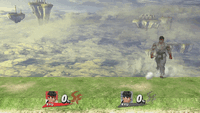
|
|---|
Taunts[edit]
- Up taunt: Turns away from the screen and tightens his headband, while stating "Come on!" (かかってこい!, Come at me!) This is one of his taunts from Street Fighter IV.
- Side taunt: Holds his fist forward, and then says "Talk is cheap!" (拳で語り合おう!, Let your fists talk!) This is also one of his taunts from Street Fighter IV.
- Down taunt: Stomps on the ground and grunts, which is taken from his taunts in most Vs. Capcom series games. While this also appears to be similar to his single taunt from Street Fighter III, it more closely resembles the stance commonly displayed by fellow Street Fighter character Akuma. It has also been used as a tag-in calling animation in many of the Marvel vs. Capcom games.
| Up taunt | Side taunt | Down taunt |
|---|---|---|
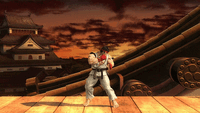
|
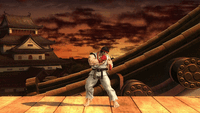
|
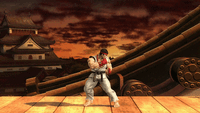
|
Idle poses[edit]
- Adjusts his gloves.
- Wriggles the fingers on both hands, then crosses his arms and pumps them.
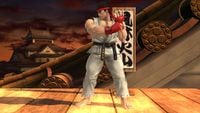 |
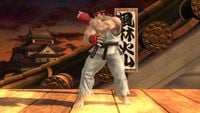
|
|---|
Crowd cheer[edit]
Victory poses[edit]
- Winds back to throw a hook and assumes an upright stance while saying "Give it your all!" (必殺のタイミングを計れ!, Gauge the timing of your sure-kill!). This victory animation is directly taken from his victory pose in Street Fighter IV, with the same quote being one of several optional victory quotes that Ryu is able to speak.
- Slings his duffel bag over his shoulder while saying "The journey... has just begun." (旅はまだ…始まったばかりだ, Yet the journey... has just begun.).
- Throws an uppercut, a hook and then another uppercut while saying "Your range is one fist short." (その間合いじゃ、拳半分届かない!, That range of yours, doesn't reach half a fist!). The concluding uppercut pose is a reference to one of his more recurring victory poses, where he raises his fist in the air triumphantly.
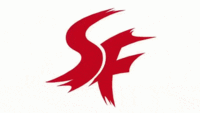 |
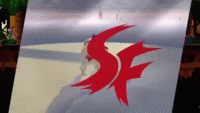 |
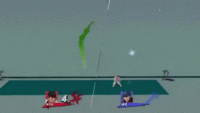
|
|---|
In competitive play[edit]
Most historically significant players[edit]
See also: Category:Ryu players (SSB4)
Darkshad - One of the best Ryu players in the world. Placed 5th at The Big House 8, 7th at GameTyrant Expo 2017, 9th at both Smash 'N' Splash 3 and Frostbite 2018, and 13th at 2GGC: Midwest Mayhem Saga with wins over players such as ZeRo, Nairo, and MkLeo.
Gen - The best Ryu player in Tri-state. Placed 3rd at ALPHA II, 9th at both Xanadu - End of an Era and Smash Sounds, 13th at XenoSaga XIII, and 17th at 2GGC: SCR Saga with wins over players such as Mr. E, Locus, and 6WX. Ranked 8th on the New York City Power Rankings.
False - Used Ryu as a secondary alongside Sheik and Marth. Placed 2nd at 2GGT: The False Awakens, 7th at CEO 2016, 9th at EVO 2017, 13th at MLG World Finals 2015, and 17th at Pound 2016.
Kuwa - The best Ryu player in Japan. Placed 2nd at Karisuma Tokaigi Qualifiers, 5th at Sumabato 27, 9th at Umebura 33, 13th at Umebura Japan Major 2017, and 25th at 2GGC: SCR Saga with wins over players such as Ally, Larry Lurr, and Ranai.
Locus - One of the best Ryu players in the world. Placed 7th at 2GGC: Civil War, DreamHack Austin 2017, and 2GGC: Greninja Saga, as well as 9th at both 2GGT: ZeRo Saga and Get On My Level 2018 with wins over players such as Nairo, Ally, and Tweek.
PiXL - Placed 3rd at Salt Lake Gaming Con, 5th at Rise 2017, 13th at 2GGC: SCR Saga, 17th at GameTyrant Expo 2017, and 25th at SwitchFest with wins over players such as Cosmos, Ned, and falln.
takera - One of the best Ryu players in Japan. Placed 5th at Umebura 27, 7th at Umebura Japan Major 2017, 9th at Umebura T.A.T., and 17th at both Umebura 30 and EVO 2018 with wins over players such as MkLeo, Abadango, and KEN.
THUNDER - One of the best Ryu players in Canada. Placed 9th at The Big House 8, 13th at both Get On My Level 2017 and EGLX 2018, 17th at Super Smash Con 2017, and 25th at Get On My Level 2018 with wins over players such as Tweek, Mistake, and Larry Lurr. Ranked 7th on the Smash Canada Rankings.
Trela - The best Ryu player in the world for the first 2 years of the game's active lifespan. Placed 1st at 2GGT: Fresh Saga, 4th at Clutch City Clash 2, 9th at both The Big House 5 and EVO 2016, and 17th at 2GGC: Civil War with wins over players such as ZeRo, MkLeo, and VoiD. Formerly ranked as high as 1st on the Texas Power Rankings.
Venom - One of the best Ryu players in Canada. Placed 5th at Canada Cup 2017, 7th at DreamHack Montreal 2017, 17th at both Get On My Level 2016 and 2GGC: SCR Saga, and 25th at Shine 2017 with wins over players such as MkLeo, Ally, and Mr.R.
Tier placement and history[edit]
Ever since his release, Ryu has been considered a viable character, with the control input carryover from the Street Fighter series benefitting Ryu immensely. Early on, he received excellent tournament representation and results for his DLC status, namely from smashers like 9B, DJ Jack, Locus, Venom and, most notably, Trela. The nerfs to other top tier characters such as Diddy Kong and Sheik further contributed to his better status. Ryu's tier placement, however, was a great topic of debate due to his weaknesses, namely his trouble at approaching reliably, the buffs other characters had gained, and the release of Cloud, a DLC character that was seen as just as viable as him. Despite this, he was ranked 4th on the first 4BR tier list, becoming a top-tier character.
Ryu's results would continue to decline due to the release of Corrin and Bayonetta, the buffs to Mewtwo in game updates and the spike in popularity Cloud had gained. This caused some smashers to drop him and reduced his tournament results significantly, which in turn made him rank at 9th on the second tier list, and eventually 12th on the third tier list. Ryu's results would also become more unstable, hovering between mediocre due to Trela's temporary retirement, and above average due to Locus' rise as a top player. With Trela's comeback, however, and Venom's improved results, Ryu would rise slightly to 11th/12th on the fourth and final tier list, now sharing the spot with Marth. Overall, while his strengths are larger than some other top-tiered characters, they are held back more than said characters by his more pronounced weaknesses and the dexterity to input his moves, and as such gives him a very high learning curve that has deterred his tournament results from being as great as they initially were.
In Solo Modes[edit]
All-Star Mode[edit]
In All-Star Mode, Ryu is fought in Stage 3 in the 3DS version or Stage 5 in the Wii U version if he has been downloaded alongside Yoshi, Captain Falcon, Dr. Mario, Marth, Pit, Mega Man, and Palutena.
Congratulations Screens[edit]
3DS[edit]
Wii U[edit]
Trophies[edit]
Ryu's default trophy is obtained by clearing Classic Mode as Ryu. His alternate trophy is obtained by clearing All-Star Mode as Ryu in the 3DS version or booting up the game after downloading Ryu in the Wii U version. The Shin Shoryuken / Shinku Hadoken trophy is obtained only in the Wii U version by clearing All-Star Mode as Ryu.
- Ryu
Ryu visits from the Street Fighter series! Ryu's fighting style is based on karate, but he's mixed in some other martial arts to make his own unique style. In Smash, he will perform either weak or strong attacks depending on if you press or hold down the buttons. His special attacks also have three power levels!
Ryu makes his Super Smash Bros. debut! His fighting style is based on a form of karate, but he's mixed in some other martial arts to make his own unique style. Here his attacks can be weak or strong depending on whether you press or hold the buttons. Each of his specials have 3 levels of power using the same method.
- Arcade: Street Fighter (1987)
- Ryu (Alt.)
Ryu's Focus Attack move lets him withstand a blow and then counterattack. The longer you hold it, the longer your enemies will be stunned if you hit them. If it hits a standing enemy, the enemy will become defenseless. When that happens, cancel your Focus Attack and unleash a sick combo!
Ryu's down special, Focus Attack, allows him to withstand a single attack and then unleash a counter. The longer you hold the button, the longer a standing enemy will be stunned if you hit them. An enemy in the air will fall slowly, defenceless. When that happens, cancel the Focus Attack and go for the knock-out!
- Arcade: Street Fighter (1987)
Shin Shoryuken / Shinku Hadoken
Shin Shoryuken/Shinku Hadoken
Use this attack when Ryu is far away from an enemy to unleash a Shinku Hadoken that penetrates through the stage. But if you use it when Ryu is close to an enemy, he'll unleash a Shin Shoryuken uppercut attack. When it hits, Ryu will follow up with his other fist and launch the opponent up, up, and away!
Ryu's Final Smash takes on two different forms depending on how close Ryu is to the enemy. If he's farther away, he'll use Shinku Hadoken, a move that pulls in any enemies nearby. If closer, he'll instead use Shin Shoryuken. He'll hit the enemy once with a powerful uppercut, then follow it up with the other fist to finish the job!
Alternate costumes[edit]
All of Ryu's costumes are based on his alternate costumes from Super Street Fighter II Turbo HD Remix.

| |||||||

|

|

|

|

|

|

|

|
Reveal trailer[edit]
Gallery[edit]
Ryu's amiibo.
Ryu's unlock notice in Super Smash Bros. for Wii U after downloading him from the Nintendo eShop.
Using Shin Shoryuken on Captain Falcon on Suzaku Castle.
Ryu on Orbital Gate Assault.
Preparing to use Focus Attack on Link.
Using his forward aerial on Samus.
Using Shin Shoryuken on Sheik.
Some of Ryu's alternate costumes.
Using Shakunetsu Hadoken.
Using Joudan Sokutogeri on Pit.
Ryu's being screen KO'd.
Trivia[edit]
- Ryu and Roy are the only DLC characters to be released on the same day as their announcement.
- Ryu is the first playable character in Super Smash Bros. to originate from a fighting game series, that being Street Fighter.
- The introduction of Ryu's trailer is a reference to the opening of Super Street Fighter II.
- Additionally, Ryu performing his Shoryuken against Mario's F.L.U.D.D. is a reference to his ending in the Street Fighter II games when he performs a Shoryuken under a waterfall.
- Ryu's attributes generally follow the mechanics of his home series:
- He can perform special moves without using the special button by instead using a specific directional input and the standard attack button. This replicates the process of performing special moves in Street Fighter and most traditional fighting games.
- This also makes Ryu the only character in Super Smash Bros. 4 who is able to perform his neutral special after obtaining a Smash Ball (Ken in Ultimate would share this distinction), although Kirby may also perform his neutral special after obtaining a Smash Ball if he has first inhaled Ryu.
- All of his attacks emit sound effects directly taken from Street Fighter II if landed. This makes Ryu the second character to emit unique sound effects when fighting, with the first being Snake and the third being Cloud. Coincidentally, all three are third-party characters.
- His shield also emits a unique sound effect if hit, and a perfect shield emits the parry sound effect from Street Fighter III: 3rd Strike. This makes him the only character to emit separate sound effects while defending.
- His very slow air acceleration is a nod to how jumps function in the Street Fighter series, in which they follow an arc and cannot be made to change direction once initiated.
- His tapped and held inputs are a reference to the original Street Fighter, where the player had to tap the button for weaker attacks, or hold it for stronger ones. They also, to some extent, incorporate the light, medium, and heavy classifications of attacks that became the series' standards.
- The beginning of his dash causes him to do a quick shuffle forward, replicating his dash from Street Fighter III onward. This shuffle is entirely aesthetic and has no unique function, although it does require more precision in the player's inputs to dash-dance properly.
- Collarbone Breaker's shield-breaking property is based on its usage as an overhead in his home series, in which it is frequently used as a way to attack opponents who are blocking low.
- His tapped neutral attack must hit an opponent to initiate the rest of the combo, referencing Target Combos.
- His ability to perform one of two Final Smashes is a possible reference to the Ultra Combo Double mechanic introduced in Ultra Street Fighter IV, which allows fighters to perform one of their two Ultra Combos at the cost of less attack power than only using a single preset Ultra Combo.
- Incidentally, Ryu is the first character in the Super Smash Bros. series to possess two Final Smashes in the same game.
- The way Ryu always faces the screen, regardless of what side he's facing, is a reference to how he faces the screen in the Street Fighter games.
- He can perform special moves without using the special button by instead using a specific directional input and the standard attack button. This replicates the process of performing special moves in Street Fighter and most traditional fighting games.
- Ryu's supine position is nearly identical to his KO'd pose from his home series.
- Oddly, Ryu's up and side taunts have their voice clips swapped from Street Fighter IV. In said game, Ryu also does not turn around while adjusting his headband.
- Ryu, Roy, Cloud, Corrin, and Bayonetta are the only characters to emit different voice clips when using battering items.
- Coincidentally, they are all DLC characters.
- Ryu is the only third-party character in SSB4 (and the second overall, after Snake) who cannot wall jump.
- Ryu, Roy, Cloud, Corrin, and Bayonetta's voice clips are in much lower quality than the rest of the cast in Super Smash Bros. for Nintendo 3DS.
- Ryu is the only DLC newcomer to not have two separate models for his alternate costumes.
- Ryu is one of the few characters to speak during a blast KO: his alternate KO line has him saying "What?".
- Similarly to Little Mac, Ryu shares some small animations with Captain Falcon. In Ryu's case, most of his hitstun animations, along with his tumbling animation, are directly taken from Captain Falcon.
- Ryu, along with Mega Man, is one of two characters to have special "hit" sound effects, with his being ripped right from the Street Fighter series.
- Coincidentally, they are both Capcom fighters.
Notes[edit]
- 1.^ translates to "Roundhouse Kick"
- 2.^ translates to "Toe Kick"
- 3.^ translates to "Uppercut Elbow"
- 4.^ translates to "Flying Front Foot Edge
- 5.^ translates to "High-Level Foot Edge Kick"
- 6.^ translates to "Rotating Leg Sweep"
- 7.^ translates to "Front Kick"
- 8.^ translates to "Scooping Punch"
- 9.^ translates to "Knee Kick"
- 10.^ translates to "Shoulder Throw"
- 11.^ translates to "Circle Throw"
External links[edit]
References[edit]
| Fighters in Super Smash Bros. 4 | |
|---|---|
| Veterans | Bowser · Captain Falcon · Charizard · Diddy Kong · Donkey Kong · Dr. Mario · Falco · Fox · Ganondorf · Ike · Jigglypuff · King Dedede · Kirby · Link · Lucario · Lucas · Luigi · Mario · Marth · Meta Knight · Mewtwo · Mr. Game & Watch · Ness · Olimar · Peach · Pikachu · Pit · R.O.B. · Roy · Samus · Sheik · Sonic · Toon Link · Wario · Yoshi · Zelda · Zero Suit Samus |
| Newcomers | Bayonetta · Bowser Jr. · Cloud · Corrin · Dark Pit · Duck Hunt · Greninja · Little Mac · Lucina · Mega Man · Mii Fighter (Mii Brawler · Mii Gunner · Mii Swordfighter) · Pac-Man · Palutena · Robin · Rosalina & Luma · Ryu · Shulk · Villager · Wii Fit Trainer |
|
| |
|---|---|
| Fighters | Ryu (SSB4 · SSBU) · Ken (SSBU) |
| Assist Trophy | Guile |
| Stage | Suzaku Castle |
| Trophies and Spirits | Trophies · Spirits |
| Music | SSB4 · Ultimate |
| Other | World Tour |






